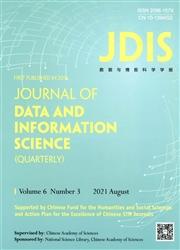通过自我引用网络跟踪变革性研究对技术和政策的直接和间接影响
IF 1.5
3区 管理学
Q2 INFORMATION SCIENCE & LIBRARY SCIENCE
引用次数: 0
摘要
目的 向非学术受众传播学术知识在一定程度上依赖于后续引用论文的转化。本研究旨在基于小我引用网络,探讨变革性研究对技术和政策产生的直接和间接影响。设计/方法/途径 基因工程和天体物理学领域的关键诺贝尔奖获奖论文(NPs)被视为变革性研究的代表。在这篇论文中,我们引入了引用专利的网络结构指标来衡量目标文章的技术影响力,并将政策引用作为衡量政策影响力的初步工具。研究结果 研究结果表明,在基因工程领域,NPs 对技术和政策的影响高于其后续引用代,但在天体物理学领域则不然。研究局限 诺贝尔奖的选择并不均衡,而且本研究使用的数据库《维度》存在不完整和引文链接不准确的问题。实际意义 我们的研究结果为更好地理解变革性研究在技术和政策影响方面的特点提供了有用的线索。原创性/价值 本研究提出了一个新的框架,用于探索变革性研究对技术和政策产生的直接和间接影响。本文章由计算机程序翻译,如有差异,请以英文原文为准。
Tracking direct and indirect impact on technology and policy of transformative research via ego citation network
Purpose The disseminating of academic knowledge to nonacademic audiences partly relies on the transition of subsequent citing papers. This study aims to investigate direct and indirect impact on technology and policy originating from transformative research based on ego citation network. Design/methodology/approach Key Nobel Prize-winning publications (NPs) in fields of gene engineering and astrophysics are regarded as a proxy for transformative research. In this contribution, we introduce a network-structural indicator of citing patents to measure technological impact of a target article and use policy citations as a preliminary tool for policy impact. Findings The results show that the impact on technology and policy of NPs are higher than that of their subsequent citation generations in gene engineering but not in astrophysics. Research limitations The selection of Nobel Prizes is not balanced and the database used in this study, Dimensions , suffers from incompleteness and inaccuracy of citation links. Practical implications Our findings provide useful clues to better understand the characteristics of transformative research in technological and policy impact. Originality/value This study proposes a new framework to explore the direct and indirect impact on technology and policy originating from transformative research.
求助全文
通过发布文献求助,成功后即可免费获取论文全文。
去求助
来源期刊

Journal of Data and Information Science
INFORMATION SCIENCE & LIBRARY SCIENCE-
CiteScore
3.50
自引率
6.70%
发文量
495
期刊介绍:
JDIS devotes itself to the study and application of the theories, methods, techniques, services, infrastructural facilities using big data to support knowledge discovery for decision & policy making. The basic emphasis is big data-based, analytics centered, knowledge discovery driven, and decision making supporting. The special effort is on the knowledge discovery to detect and predict structures, trends, behaviors, relations, evolutions and disruptions in research, innovation, business, politics, security, media and communications, and social development, where the big data may include metadata or full content data, text or non-textural data, structured or non-structural data, domain specific or cross-domain data, and dynamic or interactive data.
The main areas of interest are:
(1) New theories, methods, and techniques of big data based data mining, knowledge discovery, and informatics, including but not limited to scientometrics, communication analysis, social network analysis, tech & industry analysis, competitive intelligence, knowledge mapping, evidence based policy analysis, and predictive analysis.
(2) New methods, architectures, and facilities to develop or improve knowledge infrastructure capable to support knowledge organization and sophisticated analytics, including but not limited to ontology construction, knowledge organization, semantic linked data, knowledge integration and fusion, semantic retrieval, domain specific knowledge infrastructure, and semantic sciences.
(3) New mechanisms, methods, and tools to embed knowledge analytics and knowledge discovery into actual operation, service, or managerial processes, including but not limited to knowledge assisted scientific discovery, data mining driven intelligent workflows in learning, communications, and management.
Specific topic areas may include:
Knowledge organization
Knowledge discovery and data mining
Knowledge integration and fusion
Semantic Web metrics
Scientometrics
Analytic and diagnostic informetrics
Competitive intelligence
Predictive analysis
Social network analysis and metrics
Semantic and interactively analytic retrieval
Evidence-based policy analysis
Intelligent knowledge production
Knowledge-driven workflow management and decision-making
Knowledge-driven collaboration and its management
Domain knowledge infrastructure with knowledge fusion and analytics
Development of data and information services
 求助内容:
求助内容: 应助结果提醒方式:
应助结果提醒方式:


